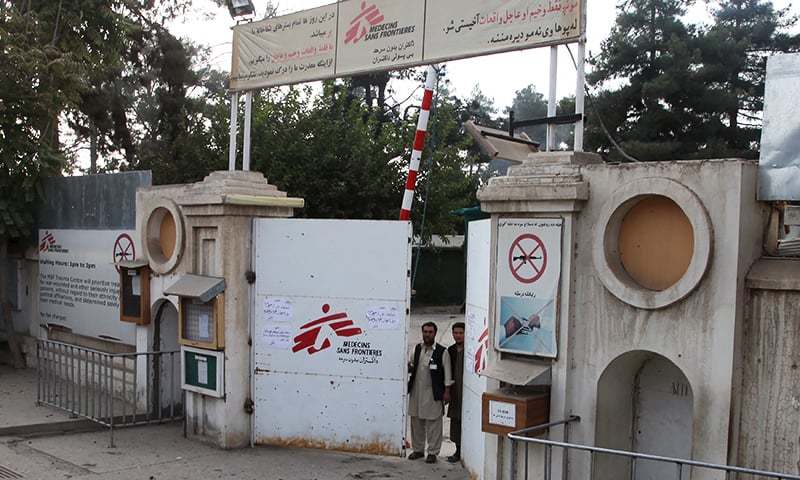U.S. Admits Human Error Behind Deadly MSF Hospital Strike
More questions than answers on the MSF strike in Kunduz

NEW DELHI: A United States General of Wednesday admitted that a US strike on a on a hospital facility run by Médecins Sans Frontières (Doctors Without Borders) that killed 30 patients and staff in the war torn city of Kunduz last month was caused by an error and could have been avoided.
Gen. John Campbell, the top NATO and U.S. commander in Afghanistan said that the strike mistakenly targeted the MSF hospital facility, instead of a suspected nearby site, from which Taliban fighters were firing.
"The proximate cause of this tragedy was the direct result of avoidable human error, compounded by process and equipment failures," Campbell told reporters in Kabul Wednesday."U.S. forces would never intentionally (strike) a hospital" or other protected sites, he said.
The General was speaking on the basis of a report that followed an investigation into the incident, concluding that forces directly involved in the airstrike did not know the compound targeted was the Doctors Without Borders hospital, and that the facility was misidentified as a target by U.S. personnel who believed they were striking a nearby building where there were reports of insurgents taking shelter.
MSF, however, has said in the past that its coordinates were given to the US mission in Afghanistan, and that the strike continued even after MSF informed American and Afghan officials that its facility had been struck.
The incident has seen a spate of contradicting accounts, with the coalition and Afghan military contradicting each other. Last month, Afghanistan’s acting Defence Minister, Masoom Stanekzai, justified the strike, telling The Associated Press in an interview that Taliban insurgents were using the facility as a “safe place.” Stanekzai said a Taliban flag had been hoisted on the walls around the hospital compound. "That was a place they wanted to use as a safe place because everybody knows that our security forces and international security forces were very careful not to do anything with a hospital," Stanekzai said. "But when there was on one of the walls of the hospital, there was a Taliban flag -- what can you think?"
"I am saying the compound was being used by people who were fighting there, whether it was Taliban or ISI or whoever they were," he said.
Kate Stegeman, MSF's communications director in Afghanistan reiterated that no armed combatants were in the hospital at any time, with MSF staff providing much needed medical care to victims of war in Kunduz -- as Taliban militants captured the city. "We reiterate that every staff member in Kunduz working for MSF has repeatedly reported to us that there were no armed people in the hospital at the time of the bombing,” Stegeman said.
Meanwhile, MSF demanded a clear explanation for the strike, claiming that the attack was deliberate. “The hospital was repeatedly hit both at the front and the rear and extensively destroyed and damaged, even though we have provided all the coordinates and all the right information to all the parties in the conflict," Christopher Stokes, general director MSF (Médicins Sans Frontiéres) told AP.
"The extensive, quite precise destruction of this hospital ... doesn't indicate a mistake. The hospital was repeatedly hit," he pointed out.
The US also kept contradicting itself. Previously, General John Campbell conceded that the strike was called by US special operations forces and not their Afghan allies, as had been originally alleged. Before that, however, General Campbell had given a different version of events. The General said that Afghan forces had requested US air cover after being engaged in a “tenacious fight” to retake the northern city of Kunduz from the Taliban.
Campbell changed the story a few days later saying that Afghan forces had not directly communicated with the US pilots of an AC-130 gunship overhead.
Then a day later, Campbell told the Senate armed services committee that “Even though the Afghans request that support, it still has to go through a rigorous US procedure to enable fires to go on the ground. We had a special operations unit that was in close vicinity that was talking to the aircraft that delivered those fires.”
MSF on its part hold the US military entirely responsible. “The US military remains responsible for the targets it hits, even though it is part of a coalition,” said MSF Director General Christopher Stokes.
MSF president Meinie Nicolai described the incident as "abhorrent and a grave violation of international humanitarian law.”
"All indications currently point to the bombing being carried out by international Coalition forces," MSF said. The charity further added that US and Afghan forces had been provided exact coordinates of the hospital facility -- which was bombed overnight in strikes that lasted over an hour.
“MSF wishes to clarify that all parties to the conflict, including in Kabul and Washington, were clearly informed of the precise location (GPS Coordinates) of the MSF facilities in Kunduz, including the hospital,” MSF stated.
Further, the organisation added that the strikes appeared to continue even after MSF contacted US forces. “The bombing in Kunduz continued for more than 30 minutes after American and Afghan military officials in Kabul and Washington were first informed by MSF that its hospital was struck,” MSF said.
What exactly happened and why? Even after the investigation has concluded, is no clear answer.



